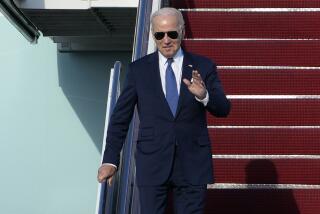Europe’s Peace Duty
- Share via
The last Serbian soldier has left Kosovo, and now NATO fears that the last Serbian civilian might not be far behind. Neither NATO’s assurances of protection for all people in the province nor the well-publicized return of several hundred Serbs who left when the Serbian military pullout began seems to have stemmed the exodus. About one-fourth of Kosovo’s 200,000 Serbs are thought to have fled, fearing the wrath of ethnic Albanian refugees coming home to torched homes and the evidence--and memories--of mass killings. Kosovo, though still legally a part of Serbia, is becoming empty of Serbs.
Serbia’s sovereignty in any case will soon count for little. It is inconceivable that the Belgrade regime that ordered the atrocities in Kosovo will be allowed to reclaim more than a token presence under the close scrutiny of NATO’s peacekeepers. Instead, responsibility for civil administration now falls to the United Nations. A new Kosovar police force must be recruited and trained, courts independent of political control set up, a tax collection system put in place. Since Kosovo is to regain a large measure of autonomy, local elections will have to be held.
The first step toward establishing the rule of law came with the pullout of Serbian military and police units. The second step will come with the demilitarization within 90 days of the Kosovo Liberation Army, the guerrilla force that controls large parts of the province pending the full arrival of NATO’s 48,000 peacekeepers. The KLA seeks independence for Kosovo. The agreement that was reached with Yugoslav President Slobodan Milosevic appeared to foreclose that possibility. But perhaps not entirely.
The U.N. Security Council resolution endorsing the Kosovo settlement took “full account” of the earlier Rambouillet accords, which Milosevic had refused to accept. Among Rambouillet’s provisions was that Kosovo’s future would eventually be decided by an international conference that would note the “will of the people” of Kosovo. That seems to keep open the door to eventual separation from Serbia.
The United Nations has not been notably adept in the past at institution-building in battered lands. Maybe this time, with generous reconstruction help from the European Union, the United States and others and with greater cooperation instead of turf-protecting competition among international agencies, it will do better. Since Serbia has been denied reconstruction aid while Milosevic clings to power, Kosovo will be the chief recipient. That is a big plus for the Kosovars.
NATO’s job is to establish a secure climate for rebuilding. How long its protectorate will last isn’t clear, but whatever the duration it’s a job the Europeans have the means to handle, with a steadily diminishing U.S. presence. NATO’s war-fighting ability might depend largely on the air power and other resources the United States can bring to bear, but peacekeeping in Kosovo should quickly become an essentially all-European responsibility.
More to Read
Sign up for Essential California
The most important California stories and recommendations in your inbox every morning.
You may occasionally receive promotional content from the Los Angeles Times.










